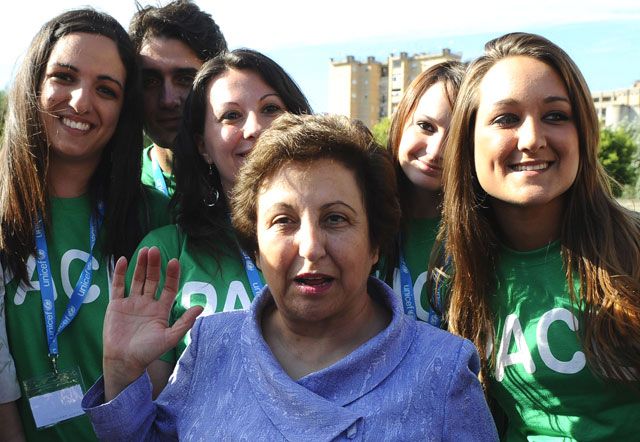Tehran: Iranian authorities have confiscated Nobel Peace laureate Shirin Ebadi's medal, the human rights lawyer said, in a sign of the increasingly drastic steps Tehran is taking against any dissent.
In Norway, where the peace prize is awarded, the government said on Thursday the confiscation of the gold medal was a shocking first in the history of the 108-year-old prize.
Ebadi won the Nobel Peace Prize in 2003 for her efforts in promoting democracy. She has long faced harassment from Iranian authorities for her activities - including threats against her relatives and a raid on her office last year in which files were confiscated.
The seizure of her prize is an expression of the Iranian government's harsh approach to anyone it considers an opponent - particularly since the massive street protests triggered by hard-line President Mahmoud Ahmadinejad's disputed June 12 re-election.
Acting on orders from Tehran's Revolutionary Court, authorities took the peace prize medal about three weeks ago from a safe-deposit box in Iran, Ebadi said in a phone interview from London. They also seized her Legion of Honor and a ring awarded to her by a German association of journalists, she said.
Authorities froze the bank accounts of her and her husband and demanded $410,000 (Dh1.5 million) in taxes that they claimed were owed on the $1.3 million she was awarded. Ebadi said, however, that such prizes are exempt from tax under Iranian law. She said the government also appears intent on trying to confiscate her home.
Ebadi, the first Muslim woman to be awarded the peace prize and the first female judge in Iran, said she would not be intimidated and that her absence from the country since June did not mean she felt exiled.
"Nobody is able to send me to exile from my home country," she said on Thursday. "I have received many threatening messages. ... They said they would detain me if I returned, or that they would make the environment unsafe for me wherever I am.
"But my activities are legal and nobody can ban me from my legal activities."
Ebadi has criticised the Iranian government's crackdown on demonstrations by those claiming the June vote was stolen from a pro-reform candidate through massive fraud.
Ebadi left the country a day before the vote to attend a conference in Spain and has not returned since. In the days after the vote, she urged the international community to reject the outcome and called for a new election monitored by the United Nations.
During the past months, hundreds of pro-reform activists have been arrested, and a mass trial has sentenced dozens to prison terms. Authorities also went after Ebadi's human rights centre in Iran.
"After the election all my colleagues in the centre were either detained or banned from travelling abroad," Ebadi said.
Calls to Iranian judiciary officials were not returned on Thursday.
Norwegian Foreign Minister Jonas Gahr Stoere called the move "shocking" and said it was "the first time a Nobel Peace Prize has been confiscated by national authorities".
The Norwegian Foreign Ministry summoned Iran's charge d'affaires in Norway on Wednesday to protest the confiscation, spokeswoman Ragnhild Imerslund said.
The Foreign Ministry also "expressed grave concern" about Ebadi's husband, who it said was arrested in Tehran and "severely beaten" earlier this fall, after which his pension and bank account were frozen.
Ebadi said her husband, Javad Tavassolian, and her brother and sister have been threatened many times by authorities pushing them to persuade her to end her human rights campaigning.
Ebadi has represented opponents of Iran's regime before but not in the mass trial that started in August of more than 100 prominent pro-reform figures and activists. They are accused of plotting to overthrow the cleric-led regime during the postelection turmoil.
The Iranian Embassy in Norway refrained from giving a comment.
Honour: First Iranian to win the Peace Prize
Shirin Ebadi was awarded the prestigious prize in 2003 for her many years of legal work advocating on behalf of Iranian political activists, religious and ethnic minorities, women and children. She was the first Iranian to win the prize.
Since receiving the Nobel, Ebadi has lectured, taught and received awards in different countries, issued statements and defended people accused of political crimes in Iran. She has travelled to and spoken to audiences in India, the United States, and other countries; released her autobiography in an English translation; participated in the Nobel Women's Initiative along with five other Nobel Laureates.
In April 2008 she told Reuters news agency that Iran's human rights record had regressed in the past two years and agreed to defend Baha'is arrested in Iran in May 2008.
In April 2008 Ebadi released a statement saying: "Threats against my life and security and those of my family, which began some time ago, have intensified," and that the threats warned her against making speeches abroad, and defending Iran's minority Baha'i community.
In August 2008, the Irna news agency published an article attacking Ebadi's links to the Bahá'í Faith and accused her of seeking support from the West.
It also criticised Ebadi for defending homosexuals, appearing without the Islamic headscarf abroad, questioning Islamic punishments, and "defending CIA agents".
It accused her daughter, Nargess Tavassolian, of conversion to the Bahá'í faith, a capital offence in the Islamic Republic. Her daughter believes "the government wanted to scare my mother with this scenario."
Ebadi believes the attacks are in retaliation for her agreeing to defend the families of the seven Baha'is arrested in May.
- Compiled from agencies













